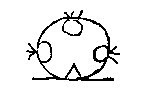Maalan Aarum 4.4
.
They having died,
the hunters,
about to depart,
met together
.
ORIGINAL SOUNDS
.
Angomelchik
elowichik
elmusichik
menalting
.
.LENAPE WORDS
.
.LENAPE WORDS
ango mechat
ei-ow chekee
ei-(ow) mosogquet(eau)
mina alting
ei-ow chekee
ei-(ow) mosogquet(eau)
mina alting
OLD NORSE WORDS
engi mikill
eiga e sterkr
eiga no' suuga taa
minni althoeng
eiga e sterkr
eiga no' suuga taa
minni althoeng
__________________________________________________
.NORSE to ENGLISH
Not many
hunters
put together
a small meeting
hunters
put together
a small meeting
.
PARAPHRASE
A few Hunters put together a small meeting.
_________________________________________________________
_________________________________________________________
.
COMMENTS:This stanza was composed by Tally Maker in South Dakota about AD 1375, 30 years after the Norse Catholic-Lenape arrived at James Bay. The pictograph shows a "round table" meeting with the locals, the triangle, included. This meeting may have been the first government by counsel in north America.
.
Deciphered by: Craig Judge, Kean University.
Verified by: Myron Paine, PH. D,
Administrator: Frank Esposito, Kean University.
_______________________________________
DETAILS
Sounds = AN GO
Lenape = ANGO
 |
| ANGV4012 |
Norse/English = NOT
Sounds = MEL CHIK
Lenape = MECHAT
 |
| MECV6063a |
Old Norse = MIKILL Sherwin may have chosen the wrong word?
Norse/English = MANY
.
Sounds = E LO WI CHIK Lenape = EI-OW 1
 |
| ElOV1046 |
Old Norse = EI GA 1
Norse/English = TO HAVE
1. The Monrovians recorded an "l" sound. They may have heard "aya" and wrote the "l" instead of "i" sound.
Sounds = I CHIK
Lenape = E CHEKEE
 |
| E V1043 |
 |
| CHEV5024 |
Norse/English = VIOLENT (or Violating)*
* The "e" syllable is supposed to modify verbs. In this case the continuing syllable "e" appears to apply to an adjective meaning "violent." Perhaps "checkee" originally meant "to violate," as in "he has to continually violate."
This phrase would have been a good paraphrase for a hunter. In any case the Lenape Historian must have known that "eiga e sterkr" was a paraphrase for hunter, because the Lenape Historian must have told the Monrovia translators that the word meant "hunters" in the Mighty Hunter stanza.
Sounds = EL MUS I CHIK
Lenape = EI-OW (SEE ABOVE) &
MO SOG QUEHT EAU 1
 |
| MOSV1109 |
2. "o" is often interchanged with "u."
3. The Moravians heard "g q" as "ch" and the "taa" as "k." They may have been familiar with the syllable "chik"
but not the Lenape word "Mosogquehteau." So they missed some syllables.
NORSE = NO' SUUGA TAA
NORSE/ENGLISH = PUTS TOGETHER
Sounds = MEN
Lenape = MINA
Oldest American History




No comments:
Post a Comment